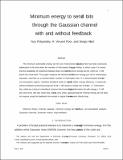Minimum Energy to Send k Bits Through the Gaussian Channel With and Without Feedback
Author(s)
Polyanskiy, Yury; Poor, H. Vincent; Verdu, Sergio
Downloadjournal_eneff.pdf (357.8Kb)
OPEN_ACCESS_POLICY
Open Access Policy
Creative Commons Attribution-Noncommercial-Share Alike
Terms of use
Metadata
Show full item recordAbstract
The minimum achievable energy per bit over memoryless Gaussian channels has been previously addressed in the limit when the number of information bits goes to infinity, in which case it is known that the availability of noiseless feedback does not lower the minimum energy per bit, which is -1.59 dB below the noise level. This paper analyzes the behavior of the minimum energy per bit for memoryless Gaussian channels as a function of k, the number of information bits. It is demonstrated that in this nonasymptotic regime, noiseless feedback leads to significantly better energy efficiency. In particular, without feedback achieving energy per bit of -1.57 dB requires coding over at least k=10[superscript 6] information bits, while we construct a feedback scheme that transmits a single information bit with energy -1.59 dB and zero error. We also show that unless k is very small, approaching the minimal energy per bit does not require using the feedback link except to signal that transmission should stop.
Date issued
2011-08Department
Massachusetts Institute of Technology. Department of Electrical Engineering and Computer ScienceJournal
IEEE Transactions on Information Theory
Publisher
Institute of Electrical and Electronics Engineers
Citation
Polyanskiy, Yury, H. Vincent Poor, and Sergio Verdu. Minimum Energy to Send k Bits Through the Gaussian Channel With and Without Feedback. IEEE Transactions on Information Theory 57, no. 8 (August 2011): 4880-4902.
Version: Author's final manuscript
ISSN
0018-9448
1557-9654